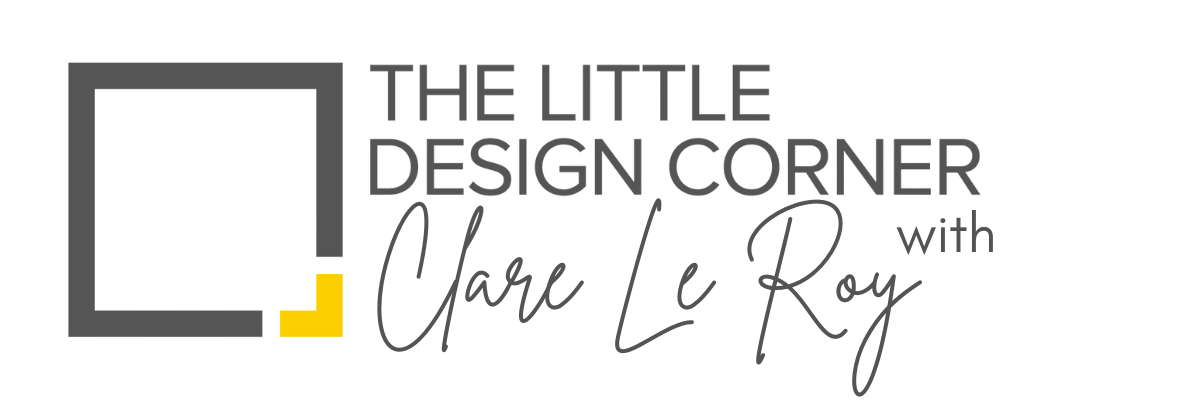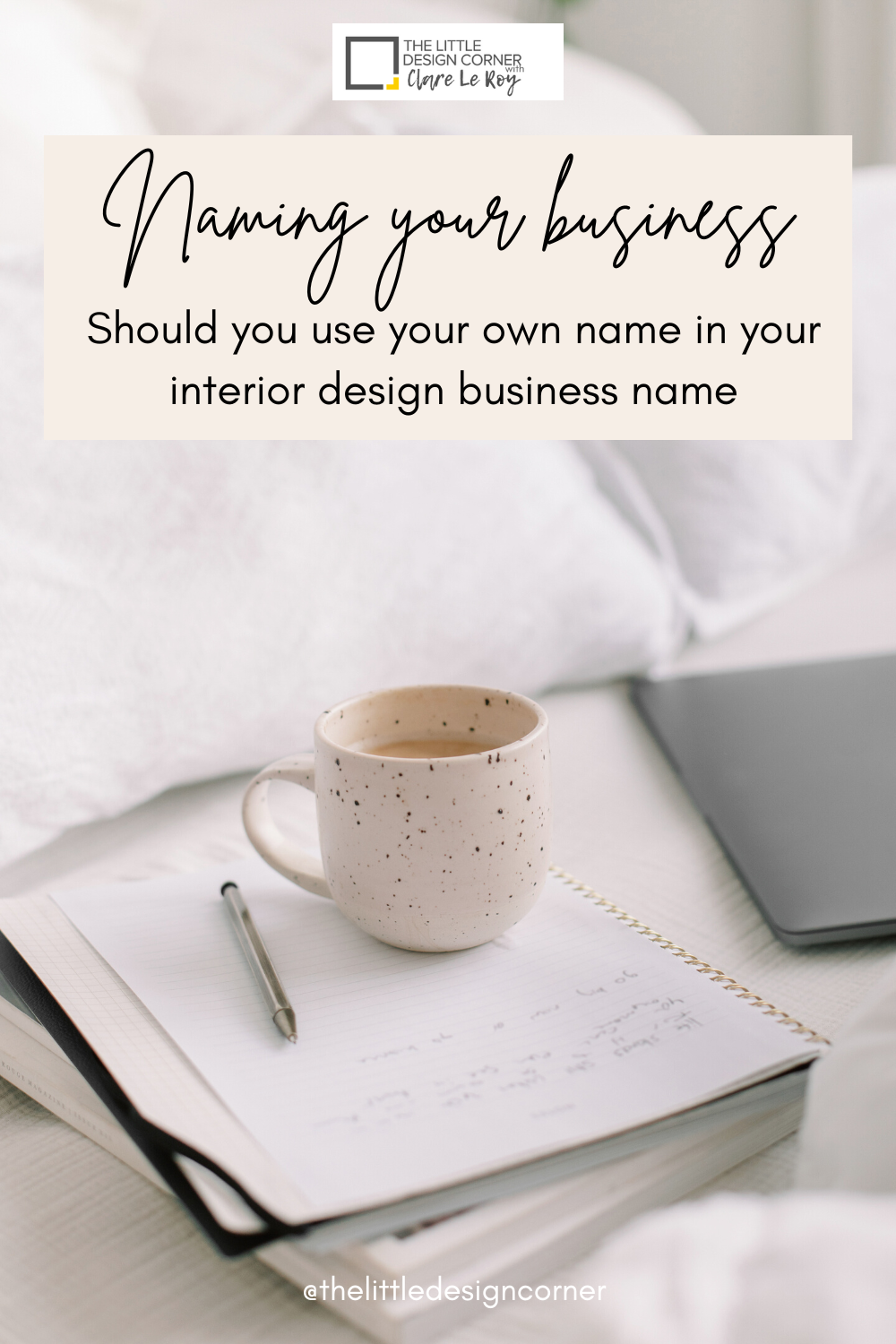Should you use your own name in your interior design business name?
One question I often get asked is whether or not to include your own name in the business name for your interior design business.
On one hand, using your own name can lend a personal touch and establish a strong sense of trust with potential clients. On the other hand, it can also make rebranding or transitioning the business to someone else more difficult.
In this post I share the pros and cons of using your own name in your interior design business name, and offer some other tips on naming your design business as well.
It’s quite common for interior designers to use their own name as the business name for their design business.
Here’s just a few famous examples:
Kelly Wearstler Interior Design, founded by designer Kelly Wearstler
Kelly Hoppen Interiors, founded by designer Kelly Hoppen
Jonathan Adler, founded by designer Jonathan Adler
Nate Berkus Associates, founded by designer Nate Berkus
Martyn Lawrence Bullard Design, founded by designer Martyn Lawrence Bullard
Studio McGee, founded by designer Shae McGee
Naming your design business after yourself can be a good way to establish a personal brand and create a sense of individual style and personality in your business. It can also be helpful for clients to know who they will be working with.
However, using your own name as the business name can also have some drawbacks. It can be more difficult to scale your business or bring on additional designers or employees if the business is closely tied to your personal brand. Additionally, if you decide to sell the business or retire, it may be more challenging to transition the business to new ownership if it is closely tied to your personal brand.
Having said that, lots of hugely successful brands have been named after their owners. Some examples include:
Bobbi Brown Cosmetics, founded by makeup artist Bobbi Brown.
Martha Stewart Living, founded by lifestyle guru Martha Stewart.
Ralph Lauren Corporation, founded by fashion designer Ralph Lauren.
Oprah Winfrey Network, founded by media mogul Oprah Winfrey.
Rachel Ray, founded by chef Rachel Ray.
Michael Kors, a luxury fashion brand named after designer Michael Kors.
Jo Malone, a British fragrance and candle company named after its founder Jo Malone
Tommy Hilfiger, founded by fashion designer Tommy Hilfiger
Diane von Furstenberg, founded by fashion designer Diane von Furstenberg.
Calvin Klein, American fashion brand named after fashion designer Calvin Klein
Estée Lauder, American multinational manufacturer and marketer of prestige skincare, makeup, fragrance and hair care products, company was named after Estée Lauder, the co-founder.
And of the businesses that I mentioned, many have undergone acquisitions or changes in ownership over the years (such as Ralph Lauren and Martha Stewart Living) where the company AND the name have been purchased and used by the acquirer.
I once heard a podcast with Bobbi Brown about this exact topic and it was definitely something that she found strange and difficult as part of the acquisition of her company. She spoke about how it was a difficult decision for her to sell her name as it was a big part of her identity (obviously!).
I realise most of us aren’t trying to create massive companies like the ones I mentioned above. But the question is - were the founders of the companies above trying to create the scale of company they built when they were first starting? Or did they also think they were building something small?
And if you asked the founders of those companies now whether they would have used their own name as the company title, what might they say?
I’m not saying you shouldn’t name your business after yourself, but I am suggesting that if you do want to use your own name that you consider the pros and cons of each option before you decide which way to go.
PROS OF USING YOUR NAME
Here are some of the pros of using your own name as the business name for your interior design business:
Establishes a personal brand: Using your own name as the business name can help establish you as a thought leader and expert in the field of interior design.
Creates a sense of individual style and personality: A business name that is based on your own name can help clients get a sense of your individual style and aesthetic, which can be particularly important in the creative field of interior design.
Makes it easy for clients to identify and refer you to others: If clients have worked with you and enjoyed the experience, they may want to recommend you to others. Using your own name as the business name can make it easier for them to remember and refer you.
Allows for a more personal connection with clients: Using your own name as the business name can make it easier to create a more personal and authentic connection with clients, which can be particularly important in the design industry where the design process often involves lots of personal collaboration and communication.
CONS OF USING YOUR NAME
Here are some potential cons of using your own name as the business name for your interior design business:
May be more difficult to scale the business: If you want to bring on additional designers or employees or grow the business in other ways, it may be more challenging to do so if the business is closely tied to your personal brand. You may feel a bit weird about this as you build a larger and larger team.
May be harder to sell the business or transition ownership: If you decide to retire or sell the business, it may be more difficult to do so if the business is closely tied to your personal brand. This can be especially true if you have built up a strong personal brand and reputation in the industry. Once you aren’t the ‘face’ of the company any longer - does the brand still have the same impact in the market?
May be more challenging to establish a professional image: While using your own name as the business name can create a sense of individual style and personality, it may be more difficult to establish a professional and established image for the business as a whole. This can be particularly important if you are competing with larger, more established design companies.
When deciding which way to go, one thing that’s important is to consider your goals with your business in the future. If you really know that you are never going to want to grow your business to a huge company then I think it’s totally fine to name it after yourself. But the only question I would have is whether you really know at this stage what is going to happen in the future with your business? Probably not!
Just something to think about.
OTHER TIPS FOR NAMING YOUR DESIGN BUSINESS
Here are some other tips for naming your interior design business
Consider your ideal design client: Think about who your ideal clients are and try to choose a name that will appeal to them.
Keep it simple: Choose a name that is easy to pronounce and spell, as this will make it easier for people to remember and refer you. Try to also avoid weird spellings - like dropping letters out of words (e.g. Foundr.com have done this) - it can make it harder for people to find you that way.
Make it memorable: Choose a name that is unique and stands out, as this will help you stand out in a crowded market.
Consider using a combination of your name and a descriptive term: This can be a good way to establish a personal brand while also conveying the type of design services you offer. For example, "Sarah's Sustainable Spaces" or "John's Modern Interiors." (both of these are dreadful names by the way - but you get the idea!).
Do some research: Make sure the name you choose is not already being used by another business, and do a Google search to ensure it is not already associated with any negative connotations.
Get feedback: Ask friends, family, and colleagues for their opinions on potential names to get a sense of which ones might be the strongest contenders. But also remember that your friends and family are unlikely to be your ideal target client - so take their opinions with a grain of salt!
One more thing to consider is whether the name is easily identifiable and relevant to the design industry. For example, a name that incorporates design related terms such as "interior," "design," "space," or "style" may be more immediately identifiable as a design business (and more likely to pop up in a Google search). Similarly, if you specialise in a particular style or approach to design, such as sustainable or minimalist design, you may want to consider incorporating that into the name of your business to make it more likely to pop up in searches via Google or other search engines.
Overall, the most important thing is to choose a name that reflects your brand, business goals and values - as well as one that resonates with your ideal potential clients (and you!) the most.
By the way - if you want more tips on naming your business you may find this other blog post helpful as well - How to name your business: a guide for creatives.
Thanks for reading and catch you in my next post :)
Clare x
Dr Clare Le Roy
Courses and Templates for Designers and Architects
DO YOU WANT TO….
Improve your professionalism?
Find more clients?
Bring in more revenue?
Create better systems and processes?
Then check out my business courses and templates for designers and architects.
These courses and templates leave you with work done - not just a long list of things you need to do next. We have a really strong focus on taking action and getting things created that improve your business.








